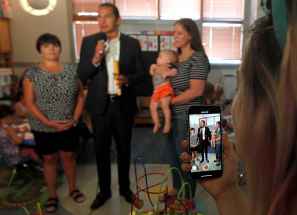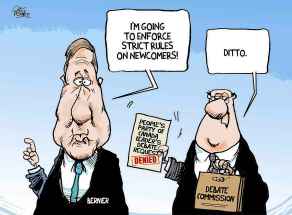Political silence on raising child-care fees is deafening
Read this article for free:
or
Already have an account? Log in here »
To continue reading, please subscribe:
Monthly Digital Subscription
$0 for the first 4 weeks*
- Enjoy unlimited reading on winnipegfreepress.com
- Read the E-Edition, our digital replica newspaper
- Access News Break, our award-winning app
- Play interactive puzzles
*No charge for 4 weeks then price increases to the regular rate of $19.00 plus GST every four weeks. Offer available to new and qualified returning subscribers only. Cancel any time.
Monthly Digital Subscription
$4.75/week*
- Enjoy unlimited reading on winnipegfreepress.com
- Read the E-Edition, our digital replica newspaper
- Access News Break, our award-winning app
- Play interactive puzzles
*Billed as $19 plus GST every four weeks. Cancel any time.
To continue reading, please subscribe:
Add Free Press access to your Brandon Sun subscription for only an additional
$1 for the first 4 weeks*
*Your next subscription payment will increase by $1.00 and you will be charged $16.99 plus GST for four weeks. After four weeks, your payment will increase to $23.99 plus GST every four weeks.
Read unlimited articles for free today:
or
Already have an account? Log in here »
Hey there, time traveller!
This article was published 20/08/2019 (2304 days ago), so information in it may no longer be current.
Everyone in Manitoba’s child-care industry knows it, but no one wants to say it out loud: one of the main reasons child-care centres are starved for cash is because parent fees have been frozen every year but two since 2002.
No political party dares even broach the subject of child-care fees in this provincial election. A pledge to raise them would be an almost certain vote-killer.
It is a real problem.
The Manitoba Child Care Association, when asked earlier this year, said raising fees is something governments should at least consider. At the time, Families Minister Heather Stefanson also agreed it was something government should be talking about.
But not in an election. That would be lethal.
Government-funded child-care centres are subject to price controls, they’re not allowed to set their own fees. In exchange for operating grants, they agree to let government set the fees.
Daily fees for pre-school children are currently set at $20.80. Those fees have been frozen since 2013. They went up $1 in both 2012 and 2013. Prior to that, they were frozen since 2002.
Manitoba has the lowest child-care fees in Canada outside of Quebec, but it has come at a price.
Centres can’t raise the revenue needed to pay the bills; staff are grossly underpaid for the work they do and management may resort to bake sale-style fundraising to make ends meet.
Successive governments have claimed they’ve offset low parent fees with higher operating grants.
They haven’t. Wait lists continue to grow, centres struggle to attract and retain quality staff, and there’s a severe shortage of capital to meet the growing demand for child care across the province.
Meanwhile, parents at all income levels — even those who can afford winter vacations and multiple flat-screen TVs in their homes — have been paying an increasingly smaller portion of child-care services.
On average, parents pay 58 per cent of the cost of government-funded child care for pre-school children and 42 per cent for infants, according to data from the Manitoba Department of Families. Every year parent fees remain frozen, that share drops.
Had fees been indexed to inflation since 2002, they would be at about $26 a day today. That would be a game changer for most child-care centres.
It would also allow government to better target its subsidies to low-income parents who can’t afford higher fees. Government already has more than 7,000 direct-subsidy spots for low-income parents. It could expand those to ensure those who truly require financial assistance get it.
Political parties in this election don’t seem terribly interested in proposing anything to fix it.
The current system doesn’t work. Governments have substantially increased operating grants to centres for years (notwithstanding the current freeze) with lofty goals of reducing waiting lists. Those efforts have failed. The wait list has grown to more than 16,000 provincewide and people still wait a year, two years, or more to get a spot.
Political parties in this election don’t seem terribly interested in proposing anything to fix it.
The NDP announced Tuesday it would lift the freeze on operating grants to centres and increase the number of child-care spots by 600 a year (1,070 a year for three years with federal dollars). That wouldn’t even put a dent in Manitoba’s wait list.
Worse, NDP Leader Wab Kinew says parent fees should be reduced to $15 a day for everyone — regardless of income — within a decade, which would further starve child-care centres of cash.
The Liberals continued their pie-in-the-sky announcements this week, proposing to increase the number of child-care spots by 18,000 over eight years. Like most of their promises, they haven’t said how government would pay for the hundreds of millions it would cost.
The Tories are least targeting low-income families, with a proposed $500 a month child-care subsidy. They’ve also been offering tax credits for private-based child-care expansions. But beyond that, and a move to increase funding for home-based child care, there’s not a lot of bold changes in their plan, either.
The reality is, if Manitobans want better child care, they’re going to have to start paying for it.
tom.brodbeck@freepress.mb.ca

Tom has been covering Manitoba politics since the early 1990s and joined the Winnipeg Free Press news team in 2019.
Our newsroom depends on a growing audience of readers to power our journalism. If you are not a paid reader, please consider becoming a subscriber.
Our newsroom depends on its audience of readers to power our journalism. Thank you for your support.









